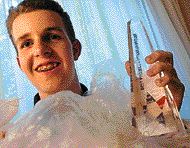
Getting ordinary plastic bags to rot away like banana peels would be an environmental dream come true.
After all, we produce 500 billion a year worldwide and they take up to 1,000 years to decompose. They take up space in landfills, litter our streets and parks, pollute the oceans and kill the animals that eat them.
Now a Waterloo teenager has found a way to make plastic bags degrade faster — in three months, he figures.
Daniel Burd’s project won the top prize at the Canada-Wide Science Fair in Ottawa. He came back with a long list of awards, including a $10,000 prize, a $20,000 scholarship, and recognition that he has found a practical way to help the environment.
Daniel, a 16-year-old Grade 11 student at Waterloo Collegiate Institute, got the idea for his project from everyday life.
“Almost every week I have to do chores and when I open the closet door, I have this avalanche of plastic bags falling on top of me,” he said. “One day, I got tired of it and I wanted to know what other people are doing with these plastic bags.”
The answer: not much. So he decided to do something himself.
He knew plastic does eventually degrade, and figured microorganisms must be behind it. His goal was to isolate the microorganisms that can break down plastic — not an easy task because they don’t exist in high numbers in nature.
First, he ground plastic bags into a powder. Next, he used ordinary household chemicals, yeast and tap water to create a solution that would encourage microbe growth. To that, he added the plastic powder and dirt. Then the solution sat in a shaker at 30 degrees.
Read moreWCI student isolates microbe that lunches on plastic bags
